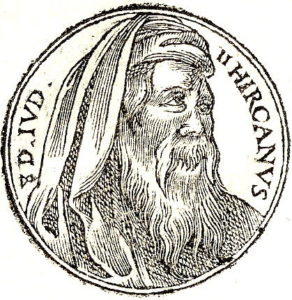 Reestablishment of Jewish Rites; Schmitta; Rights of Hyrcanus
Reestablishment of Jewish Rites; Schmitta; Rights of Hyrcanus
Two more noteworthy elements, very indicative of the new political situation in Rome, remain here to discuss: first, Caesar’s personalisation of Romeo-Jewish relations: the roman friendship is conferred to “Hyrcanus, son of Alexander and his descendants” (supra) and not to the “nation of the Jews”, as it was the case a century earlier (cf. I Mac. 8, 23). Indeed, from 47 B.C.E. onwards the name of Hyrcanus, and after him the name of Herod, are constantly present in all official documents; a feature corresponding perfectly with the personalisation of power in Rome and the inauguration of a new foreign policy consisting mostly in personal alliances with powerful men in all countries which are included in the Roman sphere of influence (Bowersock, 1981, 10-13). The second element has to do with Roman recognition of Jewish loyalty and of services rendered to Rome. Roman friendship, like all privileges offered to Hyrcanus and the Jews in the decree in question, concerns nothing more than the expression of this recognition, which emphasizes both the Roman superiority and the Jewish inferiority.
Another fragmented document, dated to the fourth dictatorship of Caesar, i.e. the beginning of 44 B.C.E. (Ant., XIV, 211-212), preserving a speech of Caesar in which he praises Hyrcanus’ loyalty and asks the Senate and the people of Rome to “provide that a requital be made to Hyrcanus, to the nation of the Jews, and to the sons of Hyrcanus” (§ 212).
According to Flavius Josephus, the initiative for the renovation of the “alliance and friendship” between Jews and Romans was of Hyrcanus II, who, being now the officially recognized successor of the Hasmoneans, decided to continue this tradition. Thus, in autumn of the year 47, he sent an embassy to Caesar (Ant., XIV, 185). Caesar’s answer was probably the one preserved in a document dated to his third or fourth dictatorship, i.e. in 46/45, which, once again, confirms the power of Hyrcanus and his descendants and declares Caesar’s resolution to send ambassadors to discuss with him about friendship and alliance with Rome:
Ant. XIV, 196-198
The following are the grants, concessions and awards made by Gaius Caesar, Imperator and Consul. That his [Hyrcanus] children shall rule over the Jewish nation and enjoy the fruits of the places given them, and that the high priest, being also ethnarch, shall be the protector of those Jews who are unjustly treated. And that envoys be sent to Hyrcanus, son of Alexander, the high priest of the Jews, to discuss terms of friendship and alliance. And that a bronze tablet containing these decrees shall be set up in the Capitol and at Sidon and Tyre and Ascalon, and in the temples, engraved in Latin and Greek characters. Also that this decree shall be communicated to all the quaestors and magistrates of the several cities and to our friends, that hospitality may be shown the envoys, and that these ordinances may be published everywhere.
The economic policy of Caesar in Judaea is known to us from another document preserved by Flavius Josephus in book XIV of his Jewish Antiquities, namely, the “Caesar’s Decree to the Jews of Judaea” (§§ 202-206), and a couple of passages from a Senate decree (§§ 207-210), voted on Caesar’s initiative (Ginsburg, 1928, 172). Both of them are dated sometime between the end of 47 and first months of 46 B.C.E. with the Senate’s decree to have been voted a bit earlier than the Caesar’s decree (Pucci-Ben Zeev, 1998, 80).